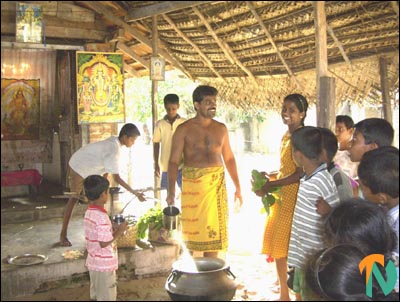Tamils observe New Year amid fragile truce
[TamilNet, Friday, 13 April 2001, 16:38 GMT]
The Tamil New Year begins Friday night at 9.27 p.m. People wear new clothes and visit friends and relatives. During the festive season there is great demand for new bank notes, which are gifted as good will money ('Kai Muluththam') to friends and relatives. Many indigenous festivities traditionally associated with the New Year have greatly diminished due to SLA restrictions and curfews.
Anointing with 'Maruththu Neer' on New Year eve is one of the Tamil religious customs in Sri Lanka's north and east have withstood inroads by Hindu traditions and Sankritic ritual. The Tamil Siddha tradition arose in medieval Tamil Nadu as a revolt against Hinduism the Sanskritic ritual and culture on which it was based. The Tamil Siddhas rejected the caste system, which was central to the Hindu social order. Institutionalised efforts by various states and Vedic movements over the centuries failed to comprehensively subsume the Tamils under the general category of the 'Hindu' due to the persistence of Tamil rituals and festivals and the periodic ascendance of religious/cultural resistance such as that of the Siddhas.  | | The priest of a Tamil temple in Koddaikallar, an island village south of Batticaloa, gives 'Maruththu Neer' to children to take home. Tamils anoint themselves with the Maruththu Neer and bathe on the eve of their New Year. Herbs, flowers and medicinal ingredients are mixed with water as prescribed in Tamil Siddha medical tradition to make the Maruththu Neer (which literally means 'medicine water'). The Maruththu Neer is distributed by priests at local Tamil temples. |
|











